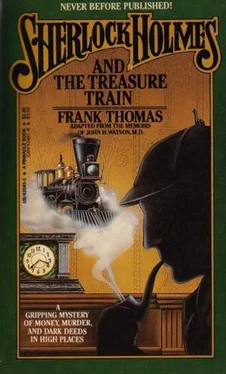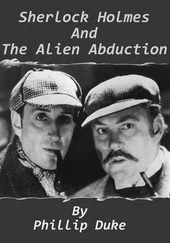The banker was not unattended, for standing behind his wheelchair was a rather loutish-looking fellow, powerful enough to have served as a bouncer at Sydney Sid's beer and gin hall in Limehouse. Hananish attempted to preserve his saintly façade when we burst in upon him, but it was a struggle, for the ends of his mouth were seized by an uncontrollable twitch.
"Mr. Holmes, though chained to this chair, it is obvious that my home has been invaded by a veritable army. This is contrary to every . . ."
His voice dwindled out, for Holmes had waved away his protestations with a gesture indicating that they were but verbal fluff. The sleuth seated himself in a Renaissance leather chair, also Spanish I judged, and proceeded to cut to the bone and then the marrow of the matter.
"We waste time," he stated, and there was that grim note of finality in his voice that I knew well. "Not only ours, but the Crown's."
He indicated the mass of papers on the mitred drop door over which Hananish's beautiful fingers were fluttering as though to wish them away.
"We shall not tamper with those papers, please, for now they are the property of the English court."
"This invasion of privacy . . ."
It was as though the man had not spoken, for Holmes continued in his flat, factual manner, which defied both interruption and contention.
"My eye has not played me false, and in that area you find usable for carpentry are scales, remains of packing cases—sufficient evidence to support the chain of events I have linked together, so let us not bandy about the word circumstantial. The dirty tricks brigade you dispatched to Essex are no more. The mine has been opened and the spurious gold shipment revealed. It was an involved scheme, which added to the risk, but you played for high stakes. *It's all over, you know."
* High stakes? Four hundred thousand pounds alone converts into two million dollars, and this before the turn of the century and the degeneration of both currencies. Holmes may have been guilty of understatement here.
The man's parchment-like complexion was tinged by a sickly yellow cast, like something disinterred. His eyes flicked to a portion of the disarray in front of him, an instinctive and revealing movement that I knew Holmes had not missed.
"The gold came to you for transshipment to London from the west coast banks. You had the ingots removed from the packing cases, which you filled with brass, plus some lead I judge, to conform with the weight of the gold. The precious metal was re-crated and sent to the Bank of England, with the false shipment made at a later date. You had already arranged the insurance with Inter-Ocean. The wooden cases, with authentic freight markings from their points of origin, were placed aboard the B & N flyer, and there was no cause for alarm. All seemed as it should be. If the shipment reached the Credit Lyonnais, you would have been exposed. So it was hijacked. A pretty plan. Once the hirelings separated the boxcar from the treasure train, they had no great problem as to the disposal of the loot, for they merely dumped it in the abandoned mine and took to their heels. The wagon and its worthless cargo might have rotted there for centuries had I not taken on the case."
"But you did, Mr. Holmes." There was a flicker in what had been lackluster eyes. This surprised me. Holmes might well have been cast in the role of the Archangel Gabriel at Jericho, for the banker's walls were tumbling down.
"I said it was a pretty plan. The west coast banks would be paid. The Credit Lyonnais would receive the insurance, and the French, persistent when faced with a loss, would have been satisfied and merely looked elsewhere for their needs. Only to find you waiting for them with the gold they wished. It was a circuitous arrangement, with sales percentages at each way stop, but it finally led to you."
"You know of that?" There was another flicker in the tired eyes of that statuesque face, and a sardonic twist came to Hananish's cruel lips.
"I know everything." From Holmes' tone, I deduced that he believed his statement. A suspicion was forming in my mind that Hananish did not.
The sleuth had been leaning forward, and suddenly he was on his feet, his long arm snaking out to pluck a cable from under the banker's nervous hands.
"Ah-hah." There was satisfaction in his manner as his eyes flashed over the message then stabbed at the banker for a moment before returning to the words, which he read aloud. "' The meddler knows all. Get out .'" Holmes dropped the cable on the desk surface and resumed his seat. "That warning came late."
"I am ill-suited to flight in any case," replied Hananish.
The flicker in his eyes had grown to a flare, and there was a look about him that raised the short hairs on the back of my neck. Then a shadow was cast by the morning sun through the door behind us. I knew Orloff was present and felt the better for it. An apparently unrelated thought sprang to mind. Holmes had discussed the Ripper matter, making it plain that his forte, reason and logic, was of scant use in tracking down one who was guided by neither. According to the rules of the game, Hananish had had it and could now only hope for aid from an astute solicitor and eloquent barrister. But there was about his patrician features a look that alerted one with medical training. He had set himself up as a rural despot and, with his mobility taken from him, had dreamed great dreams like Timur the Lame. With a treasure like Monte Cristo's at his fingertips, he might well have pictured himself as the second coming of Moriarty. Now, as with the professor, Sherlock Holmes was shoving him from the chessboard as he reached for the king piece.
My throat suddenly dry, I tried to utter a warning, but events were too fast for me.
"Hilger," called Hananish in a frantic manner, yet a wave of seeming exultation washed his face.
The brute attending him moved toward me, for I was standing with an eye on the man. Then the shadow behind me became a shape in front of me and the deceptively squat figure of Orloff was in action. The servant reached a hand for him, which was his second mistake. His first was in moving at all. Suddenly the fingers of Orloff closed on the man's wrist and there was a twist that spun Hilger around, his arm bent behind his back. The security agent's right boot swept the man's feet from the floor and Hilger fell, his jaw crashing against the converted varqeano chest in the process. Orloff stepped back, allowing the body to slump to the floor. I noted a trickle of blood from Hilger's mouth and suspected a fracture at least. It had been nothing for Orloff, a mere warm-up; but he was not allowed to continue his act, which he performed with the polished ease of a variety entertainer.
Under cover of the scuffle, Hananish had reached for the chest and a panel had sprung open in it. Now he was armed, for in his hands was a twelve-bore double-barreled shotgun, with half of its twin cylinders sawed off. It was pointing right at Holmes, both hammers at full cock. What panicked me more than anything else was the conviction that Hananish intended to fire come what may. If he did, seventy-six grams of shot at point-blank range would tear Holmes to ribbons.
Both Orloff and I were frozen. Holmes, immobilized by his seated position, was impotent to act. Then, as though it were all a slow-motion pantomime, I saw the fingers of the banker tighten and the hammers fell. There was a roar of sound.
Chapter 19
To the Lion's Den
THERE WAS more smoke than there should have been, and when it cleared, I saw why. The shotgun, a twisted and broken thing now, had burst and the full force of the powder and shot had exploded in Hananish's face. What was left would have made a shocking illustration for Washington Irving's Legend of Sleepy Hollow. Contrary to intent, it was Holmes who was Ichabod Crane, whilst Hananish was the headless horseman.
Читать дальше












